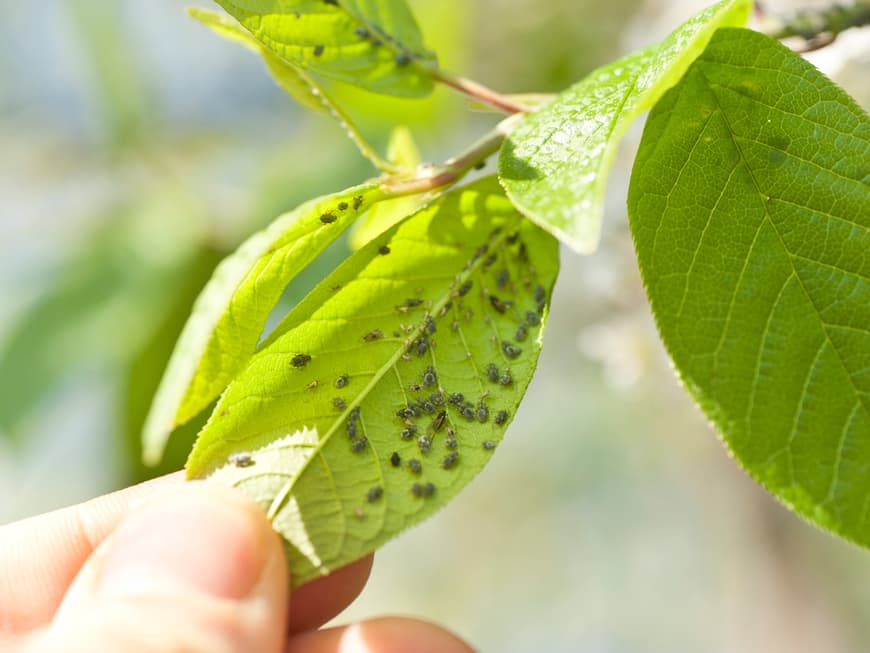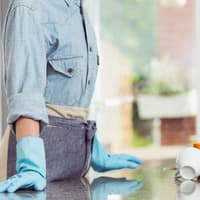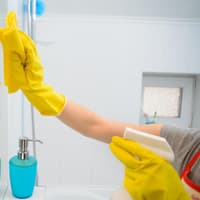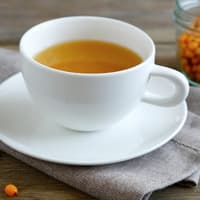
When you should expect an infestation
Under the wrong circumstances, not only young shoots but also plants that are particularly sensitive to their location can be attacked by these small insects. And even after a cold winter, contrary to popular belief, the plants are not rid of the pests. The eggs of the last generation also survive cold winters on the host plant. It is therefore advisable to cut back the plants after the winter and dispose of the pruning waste to prevent the pests from spreading again. If a plant is infested by pests that have already hatched, there are a number of home remedies for aphids that can be used to gently remove them.
Slurry as a home remedy for aphids
Horsetail slurry: Soak one kilogram of fresh or 200 grams of dried herb in ten liters of cold water for 24 hours and then dilute one liter of the slurry with five liters of water before watering or spraying it on the infested plants every week. This measure is preventative and only works against aphids in the initial stages.
Nettle slurry: One kilogram of flowering nettles must be harvested to make nettle slurry. The herbs should then ferment in ten liters of water for about one to two weeks. Afterwards, one liter of the slurry can be diluted with ten liters of water and sprayed on the infested plants every two weeks. As the mixture is very odorous, you can add a handful of rock flour to the fermenting mixture.
Get houseplants ready for winter in the fall >>>
Other liquid home remedies against aphids
Wormwood tea: In spring and summer, this tea can be used as a home remedy against aphids. To make it, you need 100 grams of fresh or ten grams of dried wormwood leaves. Brew them with one liter of boiling water and strain them through a fine sieve after 24 hours. You can then spray the cold tea on the plants.
Bracken fern broth: This household remedy for aphids is particularly suitable for indoor plants and is very easy to make. You need to mix one kilogram of fern leaves with ten liters of water. The broth can then be sprayed on the plants immediately.
Water bath: Aphids can neither swim nor breathe under water. It is therefore a good idea to immerse the plant (after carefully wrapping the pot in a plastic bag) in lukewarm water for two hours to drown the pests.
Black tea: Prepare a liter of black tea (with two tea bags), let it steep for 15 minutes and spray your plant from all sides with the tea.
Vinegar: Mix 100 milliliters of vinegar and one liter of water and spray your plant with it until it is completely soaked. Do not forget to spray the soil sufficiently with the mixture. Repeat the process if you still find aphids after a few days.
Potato water: Potato water is particularly helpful for infested roses as a home remedy against aphids, which also acts as a fertilizer. If you have boiled potatoes, you can leave the brew to cool and later spray it on your roses and the surrounding soil to counteract the pest infestation.
Onion stock: Cut a large onion into small pieces and bring to the boil in a pot filled with water. As soon as the water boils, reduce the heat and leave the onion water to simmer for 20-30 minutes. Then allow the broth to cool and spray it on the infested plant.
Milk water: For this household remedy against aphids, mix 1/3 fresh milk and 2/3 water and spray it on all sides of the plant. Don't forget to spray the undersides of the leaves as well.
Houseplant care: Tips and tricks for extra long life >>>
Other household remedies against aphids
Curdsoap and soft soap: When using this remedy, it is important to ensure that the soap used is actually curd soap or soft soap. Natural soap contains additives that are harmless to humans but can be harmful to plants. Dissolve 50 grams of grated curd or soft soap in one liter of warm water and stir until the soap has dissolved. You can then spray the mixture onto the affected plants. Two teaspoons of alcohol or spirit can be added to the mixture to intensify the effect in the case of a heavy infestation.
Savory: Savory helps prevent aphids if you place it at regular intervals between the affected plants. Beneficial insects such as ladybugs thrive in such a mixed culture and provide good natural protection against aphids.
Garlic: Garlic can help as a household remedy against aphids in cases of minor infestation. Simply stick a peeled garlic clove halfway into the soil next to each plant stem. If the infestation is more severe, however, a garlic decoction can be used. To do this, cut three large garlic cloves in half and put them in a liter of water. Leave the mixture to infuse for two weeks and then pour the decoction into a spray bottle to spray it onto the plant from all sides.






